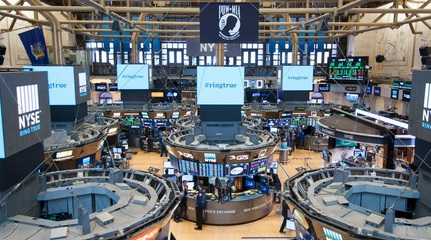
NEW YORK, March 7 (Xinhua) -- Market turmoil continued on Monday with investors dumping risk assets and moving to safe havens, on fears about the ongoing Russia-Ukraine conflict and the potential economic fallout.
All the three major U.S. stock indexes suffered massive losses, which saw the Dow plunge 797.42 points, or 2.37 percent, while the S&P 500 and the tech-heavy Nasdaq lose 2.95 percent and 3.62 percent, respectively.
The Cboe Volatility Index, widely considered as the best fear gauge in the stock market, spiked 13.98 percent to 36.45.
Gold and the U.S. dollar rose as traders sought safe havens against risks arising from the military conflict in Ukraine.
The markets remain nervous as the Russia-Ukraine conflict continues and the Western countries have been stepping up their sanctions against Russia.
U.S. Secretary of State Antony Blinken said on Sunday that Washington was in "very active discussions" with its European partners about a ban on oil imports from Russia.
The news sent oil prices even higher. The West Texas Intermediate (WTI) for April delivery added 3.2 percent to settle at 119.40 U.S. dollars a barrel on the New York Mercantile Exchange on Monday, its highest finish since September 2008. The U.S. crude benchmark traded as high as 130.50 dollars a barrel overnight.
Brent crude for May delivery increased 4.3 percent to close at 123.21 dollars a barrel on the London ICE Futures Exchange, after briefly hitting a high of 139.13 dollars per barrel.
Last week, the WTI soared 26.3 percent, while Brent jumped 25.5 percent, on supply fears.
Investors were worried that the geopolitical risks over Ukraine would complicate the outlook for inflation and cloud global growth.
"Of course, it is uncertain what effect the developments in connection with the war in Ukraine and the sanctions against Russia are going to have on prices and the economy. Energy and commodity prices have risen further and make the inflation outlook more complicated," said You-Na Park-Heger, analyst at Commerzbank Research.
If oil prices were to rise to 125 dollars a barrel or higher for two quarters, it would result in roughly half a percentage point lower in global GDP growth, and higher inflation affecting consumer spending power, according to analysts at UBS.
Experts cautioned that more market volatility is expected as geopolitical risks over the Ukraine crisis remain high.
"The crisis remains a source of continued volatility for an extended period until a new point of stalemate is reached," said Mark Haefele, chief investment officer at UBS Global Wealth Management, adding investors are recommended "to be more selective, consider portfolio hedging, and seek longer-term opportunity" to navigate market volatility.




